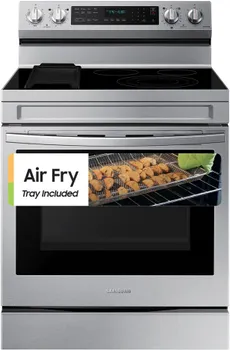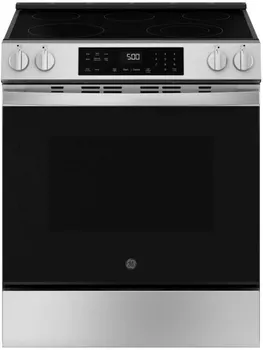At a Glance:
Pros and Cons: Installation and Layout
Freestanding vs Slide-in Ranges: A Matchup for the Ages
If you’re looking to upgrade your kitchen appliances in the new year, you may find yourself on the hunt for a new range. There are a few different choices, but the two most popular range models are freestanding and slide-in . Freestanding ranges are commonly found in most home kitchens, but slide-in range models are becoming increasingly popular.
A quality kitchen range should last somewhere between 13 and 15 years, so if your current appliance is smoking and rattling with every meal, it might be time to opt for a new stove. Modern-day ranges do much more than anchor your kitchen, they are often the focal point of the cooking space and the appliance that catches your eye before anything else.
If you’re new to cooking or hoping to elevate your culinary skills with a new and improved menu under your belt, the right kitchen appliance can make a world of difference. From induction cooktops to a touchscreen interface to self-cleaning functionality, you can find the right range to help you rectify your skills in the kitchen.
Before we delve too far into the specific features of each range type, let’s start small and explain what freestanding and slide-in ranges are and the main differences between the two.
What is a Freestanding Range?
Trying to decide which is the best cooking range for your kitchen? A freestanding range is the perfect introduction to the world of cooking appliances. A freestanding range features a cooktop surface with one or two ovens below. Freestanding ranges can be found in gas, electric, or dual fuel models, and can include a control panel for each cooking function.
A freestanding range will come with a back guard or back console that rises above the cooktop to help protect the wall behind the range from spills and splashes, and a freestanding range has finished sides that allow for easy installation between cabinets. The appliance has earned its name because the range can stand independently without another cooking counterpart to conceal the sides of the appliance.
Featured Freestanding Range: Whirlpool® 30" Fingerprint Resistant Black Stainless Steel Freestanding Gas Range

Shop This Whirlpool Freestanding Range
A flexible choice for most kitchens, this Whirlpool black gas range features a fingerprint-resistant stainless-steel finish with five cubic feet total oven capacity, five cooking elements, and Frozen Bake technology. And for greater confidence, convenience, and control in the kitchen, you will also benefit from the powerful gas burners to quickly sear and boil, plus easy-to-clean, cast-iron grates, and Closed Door Broiling designed to prevent overheating.
⭐Featured Whirlpool WFG975H0HV Review:
“Very nice range....works perfectly and helps me be a better cook.”
What is a Slide-In Range?
A slide-in range differs slightly from a freestanding range, mainly due to installation. As we mentioned, freestanding ranges can stand alone or be installed between cabinetry, whereas slide-in ranges are specifically designed to sit between cabinets for a flush and seamless look.
The configuration also differs slightly—the controls for a slide-in range model are located on the front or top of the appliance. Like freestanding models, slide-in ranges can sometimes have a back guard, which is helpful if you install your range against the wall with tile located right behind it as part of your backsplash.
The chic and modern look of a slide-in range has made it a popular choice for designers, flippers, and home cooks alike who may want to install a range in a kitchen island. The overhanding sides of a slide-in range prevent food and liquids from spilling between the cooktop and the counter, which makes for easy after-meal cleanup.
Featured Slide-In Range: GE® 500 Series 30" Stainless Steel Slide-In Electric Range

This GE slidein range isstriking with four burners and a black ceramic glass cooktop surface. Two powerful heating elements can boil water 25 percent faster and be adjusted to fit any size cookware. A spacious 5.3 cubic feet capacity offers plenty of room to prepare entire meals at once, Dual-Element Bake produces even results, and the Self-Clean cleans the oven cavity without the need for scrubbing.
⭐Featured GE GRS500PVSS Review:
“I love this Range!!! Great looking, easy to use, easy install. The Crisper is a great feature as well as the Steam clean.”
Bonus: Front-Control Range
We couldn’t neglect to mention the versatile front-control range. If you’re torn between freestanding and slide-in ranges, front-control ranges are a crash-course of the two previous range models, offering the best of both worlds. And when two worlds collide, you’re left with one of the finest products available.
Similar to a freestanding model, a front-control range has finished sides, which would make for easy installation if you’re old range is already on its way out the door. It also provides the sleek and timeless look of a slide-in kitchen range with the knobs and controls located on the front of the appliance.
Pros and Cons: Installation and Layout
Both freestanding and slide-in ranges produce similar results and functionality, but the two appliance designs aren’t entirely synonymous. Yet again, the biggest separation comes down to installation. Because slide-in ranges are installed sitting a few inches back from a wall, there is usually a couple inches of open countertop space that hooks around the back of the cooktop. If you decided you wanted to trade in your slide-in range with a freestanding range, you would need to update the layout of your countertop configuration for it to fit.
On the other hand, if you’re swapping out a freestanding range for a slide-in model, you’ll need to update the wall space behind your appliance so it won’t show signs of damage from steam, grease, and moisture.
Be sure to speak with one of our industry experts here at Don’s to make sure your new range will fit properly in your kitchen.
Freestanding vs Slide-in Ranges: A Matchup for the Ages
It's a back-and-forth heavyweight brawl between freestanding and slide-in ranges, so whose corner are you in?
Freestanding Ranges
When deciding between a slide-in or freestanding range, consider your preferred fuel type, cooking needs, and design aesthetic. Where will the range be placed? Does it require a gas line or electric hook-up? Do you want your appliance to blend into your kitchen or stand out? Does it have the features to prepare all your favorite meals? These are some questions you’ll want to ask yourself to ensure your range will fit your cooking space in every way possible.
Because a freestanding range’s sides are finished, you have more flexible installation options, including at the end of your cabinetry. They typically offer a more affordable price point compared to slide-in models, starting for less than $600, and there is a greater overall selection of freestanding ranges.
Some of the top freestanding range manufactures include KitchenAid, GE, and Bertazzoni.
Slide-In Ranges
The two main benefits of slide-in ranges are style and function, but like freestanding models, price and ease of installation play a role. Slide-in ranges can be built between two cabinets and provide additional width on top to overlap the counter. As we mentioned previously, when you push a slide-in range into its designated slot, there will be about two inches of space behind the range, allowing your counter to fill the space in the back and create a smooth and uniform built-in look with the ability to showcase your backsplash.
The ability to clean the product is more proficient in a slide-in model and it’s possible to find a more diverse selection of features, like convection and multiple high output burners. They can be slightly more expensive than a freestanding model, with a higher-end product ranging between $1,500 and $1,800.
Some of the top slide-in range manufacturers include Monogram and Whirlpool.
Freestanding vs Slide-In Range Dimensions & More
We’re not done just yet—we have a handy product comparison chart laying out the specifications of the freestanding and slide-in range models we highlighted at the beginning of the article to help you get down to the nitty-gritty.
| Product Attributes | Range Widths | Range Depth | Range Capacity | Installation | Cost |
|---|---|---|---|---|---|
| Freestanding Range | • 24" • 30" • 36" • 48" • 60" | 25”-27” | Around 2.5 to 5.5 cubic feet | Easy installation | Around $360 to $1,800 (according to HomeAdvisor) |
| Slide-In Range | • 30" • 36" • 48" • 60" | 25"-27" | Around 4 to 6.5 cubic feet | May require professional installation | Around $800 to $2000 (according to HomeGuide) |
Who Reigns Victorious?
All things considered, you could call this match a draw. If you’re a builder, a first-time homeowner, or remodeling your kitchen on a budget, then a freestanding range is a fine choice. If you just finished your kitchen renovation last year but want to upgrade and enhance the look of your space, consider a slide-in range for a clean and precise design.
Why Trust Don’s Appliances?
Founded in 1971, Don’s Appliances is a family-owned, independent appliance retailer based out of Pittsburgh, PA. Don’s has since expanded to 10 locations selling, delivering, installing, and servicing all major appliance brands. Large enough to offer competitive pricing yet small enough to continue offering the “white glove” service we pride ourselves on, our focus is always on the customer experience — from the first step into a showroom to the purchase transaction to well after your new appliance has been installed.
When our customers are remodeling or building a new house, Don’s has all the expertise, product knowledge, inventory, brands, displays, and services to meet and exceed your needs. And in the event an appliance breaks, we are there, right on time and with the right product, delivery, installation, and service.
Shop Ranges at Don’s
Don’t put off until tomorrow what you can do today, and shop cooking appliances online at Don’s Appliance. Our friendly experts are always happy to help you learn whether a freestanding vs slide in range is best for your home — whether you call us at 866-544-1711, email us, or use our online chat feature. Better yet, stop by any of our Don’s Appliances Pittsburgh, PA warehouse locations. Visit us today!
Learn More: The Best Electric Range Brands for Every Budget

